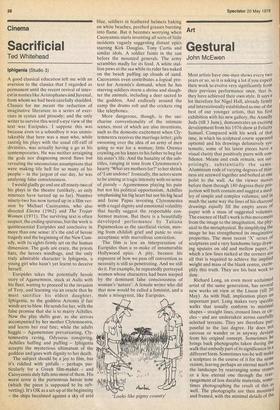Cinema
Sacrificial
Ted Whitehead
lphigenla (Studio 3) A good classical education left me with an aversion to the classics that I regarded as permanent until the recent revival of interest in nasties like Aristophanes and Juvenal, from whom we had been carefully shielded. Classics for me meant the reduction of imaginative literature to a series of exercises in syntax and prosody; and the only writer to survive this word's-eye view of the text was Euripides. I suppose this was because even to a schoolboy it was unmistakeable that here was a man who, while castirig his plays with the usual riff-raff of divinities, was actually having a go at his contemporaries. He was neither arraigning the gods nor diagnosing moral flaws but revealing the unconscious assumptions that were making life hell for so many of his people — in the jargon of our day, he was analysing false consciousness.
I would gladly go and see all ninety-two of his plays in the theatre (unlikely, as only nineteen have turned up so far). Number ninety-two has now turned up in a film version by Michael Cacoyannis, who also directed Electra (1962) and The Trojan Women (1971). The surviving text is often suspect, the ending spurious, but the work is quintessential Euripides and conclusive in more than one sense: it's the end of heroic tragedy and the beginning of the New Comedy, with its sights firmly set on the human dimension. The gods are crazy, the priests liars, the heroes windbags, and the only truly admirable character is lphigenia, a young girl who hasn't yet learnt to deceive herself.
Euripides takes the potentially heroic story of Agamemnon, stuck at Aulis with his fleet, waiting to proceed to the invasion of Troy, and learning via an oracle that he must sacrifice his eldest daughter, lphigenia, to the goddess Artemis if fair winds are to blow. He sends for her, with the false promise that she is to marry Achilles. Now the play shifts gear, as she arrives accompanied by her mother Clytemnestra, and learns her real fate; while the adults haggle — Agamemnon prevaricating, Clytemnestra raving, Odysseus conspiring, Achilles huffing and puffing — lphigenia accepts the mysterious ultimatum of the goddess and goes with dignity to her death.
The subject should be a joy to film, but it's riddled with pitfalls — perhaps particularly for a Greek film-maker — and CaCoyannis duly falls into most of them. His worst error is the portentous heroic tone (which the piece is supposed to be subverting). It's OK as a set-up at the beginning — the ships becalmed against a sky of arid
blue, soldiers in feathered helmets baking on white beaches, parched grasses bursting into flame. But it becomes worrying when Cacoyannis starts inventing all sorts of little incidents vaguely suggesting distant epics starring Kirk Douglas, Tony Curtis and similar idols. A soldier faints in the sun before the mounted generals. The army scrambles madly for its food. A white stal lion paws at the sea while its rider lies naked
on the beach puffing up clouds of sand. Cacoyannis even contributes a logical pre
text for Artemis's demand, when he has
starving soldiers storm a shrine and slaughter the animals, including a deer sacred to
the goddess. And endlessly around the camp the drums roll and the crickets ring like telephones.
More dangerous, though, is the saccharine conventionality of the intimate scenes, most of which are also inventions, such as the domestic excitement when Clytemnestra receives the marriage letter; girls swooning over the idea of an army of men going to war for a woman; little Orestes crawling on his knees to his father to beg for his sister's life. And the banality of the sub titles, ranging in tone from Clytemnestra's hearty `What are mothers for?' to her shriek of `I am undone!' Ironically, the actors seem to be aiming at tragic intensity with no sense of parody — Agamemnon playing his pain
but not his political opportunism, Achilles emphasising his big heart but not his big head and Irene Papas investing Clytemnestra with a regal dignity and emotional volatility•
that hardly suggest the respectable conformist matron. But there is a beautifully developed performance by Tatiana Papamoskou as the sacrificial victim, moving from childish grief and panic to stoic acceptance with marvellous conviction.
The film is less an interpretation of Euripides than a re-make of innumerable Hollywood epics. A pity, because his exposure of how we pass off convention as necessity is still so penetrating. And we still do it. For example, he repeatedly portrayed women whose characters had been warped by the dominant false consciousness of woman's `nature'. A female writer who did that now would be called a feminist, and a male a misogynist, like Euripides.


































 Previous page
Previous page